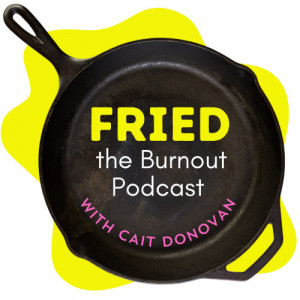
#straightfromcait: Is it a Burnout Relapse or Have You Been Burnt Out This Whole Time?
Hey FRIED Fans!I had an amazing question from a fan on IG a couple weeks ago that I wanted to answer. Shout out to @vitalitahealth on Instagram for this great Q!She asked what to do when you find yourself in a burnout relapse. When someone asks a really great question, I always like to let it roll around in my head for awhile before I decide on an answer. After rolling this one around for a few weeks, I have a counter question:Is it a burnout relapse, or have you been burnt out this whole time? When I wrote The Bouncebackability Factor (which you can snag on amazon if you haven’t gotten it yet!), I wrote that I burnt out two separate times. Since writing it, I’ve realized that I didn’t actually burn out two separate times, I was actually weaving in and out of burnout for 6 or 7 years. There were times that I felt better, for sure, but there weren’t too many times that I felt safe when I felt bad. When I say that, what I mean is - every time I felt bad or had a down day, I was nervous that it would last forever. I judged myself for feeling that way again. I thought about all the things I did to help myself and would get really discouraged that I was having a bad day. Wasn’t I doing enough? Why wasn’t it working? Why couldn’t I control this? Don’t I know better by now? Let’s compare and contrast this with what happens now when I have a bad day (because bad days still happen, I’m human! Burnout recovery does not guarantee you to have #allgooddaysallthetime). Now, when I have a bad day, I feel secure in my ability to get the care I need to get back to neutral within a decent amount of time. Sometimes that means some type of grooming self care, sometimes that means getting an acupuncture appointment or a reiki appointment, sometimes it means shutting down social media for a few days, sometimes it means chatting with friends or visiting family. The major difference is: I don’t feel unsafe, bad, guilty, wrong, or inadequate when I have a bad day. It’s just information. My body/brain/spirit need some extra love - it doesn’t even matter why, it just matters that I got the memo and can respond. If you feel like you’re relapsing, the question you should ask yourself are: Is this really a relapse or have I been burnt out this whole time? If you feel like you truly recovered previously and you are actually having a relapse, the first thing you do is reach out for help. The best option is to put yourself in someone else’s care as soon as possible. When you’re burnt out, self-healing is so much harder because not only is your cup empty, but it’s likely also cracked. So, you might find yourself doing all. the. things. but not getting the results you want. We’ve all heard that you can’t pour from an empty cup, you also can’t fill your own empty cracked cup without outside help. That outside help could be: therapy, Chinese medicine (acupuncture/herbs) reiki, coaching, somatic healing, rtt, hypnosis, massage, or any number of other techniques. Here’s what is most important when choosing them: You want to do it. There is another person in the room (even zoom room), helping to create a healing space. Other people’s energy MATTERS when you’re healing from burnout. End of story. If you want to know more about people creating healing spaces, I recommend the book Energy Medicine by Jill Blakeway. While it’s happening, you are focused on it and nothing else. Right now, it can be hard to go places to get help with restrictions still in place in many cities, but you can get assistance online - just be sure that your do not disturb is enabled and you’re not checked FB during your healing time (yeah, I see you ;)) If you feel like the truth is that you’ve actually been burnt out this whole time, the same advice applies. Reach out for help. The reason that asking the question is important isn’t that the advice is different, it’s that it makes you feel right with yourself. You understand what you’re undertaking. You know what to tell the practitioner that you’re working with. It’s always easier to move forward from clarity and it’s always easier to heal with honesty. I hope this was helpful, my beautiful FRIED Fans. As I wrap up this week’s episode, I want to remind you that subscribes, reviews, and shares make FRIED’s world go round! I am so grateful for the support you show FRIED week in an d week out! Listen to this review: @campchristy stays: This podcast is the greatest gift. I am in the throws of burnout and have just now really accepted it. And that it is physical, not just being tired and sick. Thank you. P.S. I listen to podcasts all the time. This is the first written review I’ve given. It has impacted me that much. If you want your review read on FRIED, be sure to leave the review, screenshot it and email it to me at friedtheburnoutpodcast @ gmail . com!Until next time!



